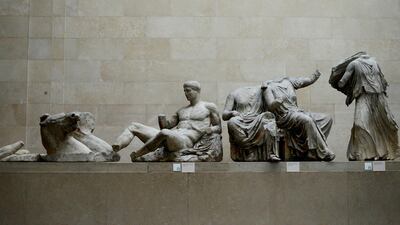Britain could be forced to return the coveted Elgin Marbles as part of Brexit negotiations with the EU following demands from Greece.
The ancient treasures, which were taken from Greece in the early 19th century, have formed a long-running dispute between the two nations with the UK refusing to return them.
Now the row has spilled over into Brexit negotiations with Greece demanding the stolen cultural artefacts are included in the draft EU negotiating mandate which was due to be finalised on Wednesday.
Despite repeated requests the British Museum in London has refused to return the 2,500-year-old Parthenon Marbles which were removed by British diplomat Lord Elgin from Athens when Greece was under Ottoman Turkish rule.
A draft of the EU nations’ position on negotiations now includes a clause requesting the "return or restitution of unlawfully removed cultural objects to their countries of origin".
An EU diplomat says the stipulation was added at the request of Greece with support from Italy.
Last month Greece's culture minister said that Athens would step up its campaign for the return of the Parthenon Marbles from London.
Lina Mendoni said she believes the circumstances are ripe at the moment for the marbles’ return.
“It is the mentality that has changed, the fact that Britain is distancing itself from the European family, it is 200 years since the Greek revolution. I think the right conditions have been created for their permanent return,” she said.
“Motivated by financial gain, publicity and self promotion, Elgin deployed illegal and untoward measures to extract from Greece the Sculptures of the Parthenon and a plethora of other antiquities in a blatant act of serial theft.”
A British government spokeswoman, commenting on the draft EU document, said the UK's position on the sculptures remained that they are "the legal responsibility of the British Museum".
"That is not up for discussion as part of our trade negotiations," she said.
Since independence in 1832, Greece has repeatedly called for the return of the sculptures but the British Museum has refused saying they were acquired by Elgin under a legal contract with the Ottoman empire. Greece, however, maintains they were stolen.
It is stepping up its campaign for their return ahead of celebrations next year to mark 200 years since the start of its revolt against Ottoman rule.
The British Museum has said “the sculptures are part of everyone’s shared heritage and transcend cultural boundaries”.
It had previously argued that Athens lacked a suitable place to preserve the marbles.
However in 2009 Greece opened a new museum at the foot of the Acropolis hill, which holds the sculptures that Elgin left behind alongside plaster casts of the missing pieces. The modern glass and concrete building’s windows reflect images of the Parthenon.
An EU source said the reference to stolen artefacts also has support from Cyprus and Spain and that, Greece's concerns about the marbles aside, EU countries were more broadly concerned about the illegal trade of artefacts through London auction houses.
British Prime Minister Boris Johnson led the UK out of the EU on January 31 and Brexit negotiations are due to start in early March.
The bloc’s document, due to be concluded on Wednesday, sets the parameters for the EU’s position ahead of the talks.


